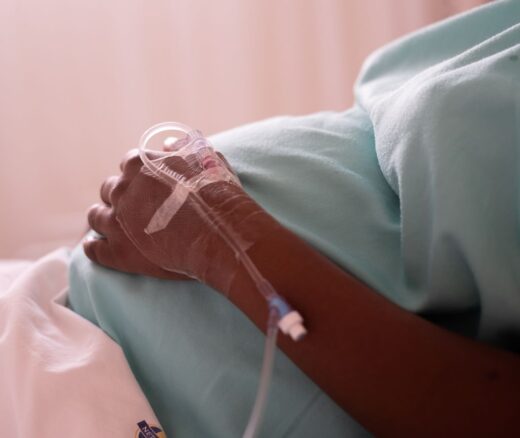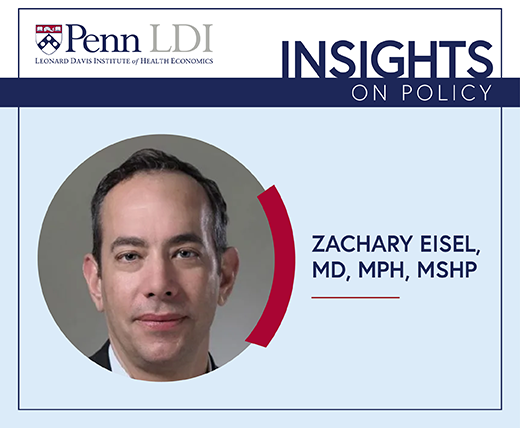
Over 500 U.S. Hospitals Have Stopped Delivering Babies Since 2010
A Crisis in Maternal Care is Unfolding—and it’s Hitting Rural and Urban Communities Alike
News
Two Penn LDI Senior Fellows – Atheendar Venkataramani, MD, PhD, and Kit Delgado, MD, MS – will be presented with top awards at the upcoming AcademyHealth Annual Research Meeting in Washington, D.C. The June event also marks the health services research organization’s return to in-person gatherings after a two-year pandemic hiatus.
Venkataramani, an Assistant Professor of Medical Ethics and Health Policy at the Perelman School of Medicine, will receive the 2022 HSR Impact Award. The honor from the AcademyHealth Board of Directors recognizes a body of research that “has had a significant impact on health care and health by successful translation and adoption of reach findings into health policy and delivery.”

In nominating him for this AcademyHealth award, LDI Executive Director Rachel M. Werner, MD, PhD, said Venkataramani’s work has “generated highly innovative research with tremendous national impact. Most importantly, his work identifies potential policy solutions to the challenges of health disparities. By answering some of the most pressing questions facing our nation, and doing so with the highest level of rigor, his research has directly influenced federal legislation, U.S. Supreme Court decisions, and Presidential Executive Orders.”
A health economist, Venkataramani is Director of the Penn Opportunity for Health Lab that studies the connections between structural racism, health disparities, and economic opportunities. Examples of some of the research for which he is being honored:
• In foundational work on health equity, Venkataramani examined the causal effects of structural racism – as embodied by officer-involved killings of unarmed Black Americans – on racial health disparities, discovering that mental health worsens with police killings, not just for those associated with the killings, but for the entire population.
• In a series of studies on the health consequences of immigration policy, Venkataramani demonstrated that protection from deportation for undocumented immigrants and resulting economic opportunities confer large mental health benefits and increase access to key benefit programs.
• His 2020 JAMA Internal Medicine study highlighted the role of economic opportunity on health by linking automotive assembly plant closures to opioid overdose deaths. These results were prominently cited in testimony to the U.S. Senate’s hearing on the opioid crisis and in a landmark 2021 National Academies of Science, Engineering, and Medicine report on midlife mortality in the U.S.
• Venkataramani’s randomized evaluation of a controversial Medicaid-waiver program in Kentucky led CMS to call for more rigorous program evaluations of Medicaid waivers. His work documenting administrative burdens in the Special Supplemental Nutrition Program for Women, Infants, and Children (WIC) program helped shape President Biden’s 2021 Executive Order on Transforming Federal Government Customer Experience and Service Delivery to Rebuild in Government as well as a recent U.S. Senate bill, the “MODERN WIC Act.”
Delgado is receiving the 2022 AcademyHealth Publication of the Year Award for the paper Comparative Effectiveness of an Automated Text Messaging Service for Monitoring COVID-19 at Home that appeared in the February edition of the Annals of Internal Medicine.

Funded by the Patient-Centered Outcomes Research Institute (PCORI), the article recaps the creation, testing, and successful use of the Penn Medicine-developed algorithm-driven text messaging app COVID Watch. The system was pioneered at the pre-vaccine height of the pandemic in 2020 as the University of Pennsylvania Health System’s emergency rooms were overwhelmed beyond capacity with coronavirus patients.
The automated COVID Watch system enabled Penn Medicine clinician teams to remotely extend and amplify daily monitoring and care to thousands of COVID patients in their homes.
Patients enrolled in the COVID Watch program were 68% less likely to die from COVID-19 than those in a control group of people not using the program.
Although initially developed to address COVID-19, the system has since been widely publicized and hailed as extraordinary evidence of how new forms of automated digital medicine can be efficiently applied across a wide variety of conditions and populations in the post-pandemic future.
Other LDI Senior Fellows who involved in the COVID Watch project were Anna Morgan, MD, MSc; David Asch, MD, MBA; Austin Kilaru, MD, MSHP; Ari Friedman, MD, PhD; Zachary Meisel, MD, MPH; and Nandita Mitra, PhD.
The two AcademyHealth winners will be guests of honor at the LDI AcademyHealth party scheduled for 5 p.m. at the Yardbird Table & Bar in Washington, D.C.


A Crisis in Maternal Care is Unfolding—and it’s Hitting Rural and Urban Communities Alike

Stable Payments Improved Margins But Not Liquidity, New LDI Analysis Finds

LDI Senior Fellow Cited for “Significant Contributions” in Research

Outdated Laws Target Black and Queer Lives in Over 30 States, Fueling a Deadly Disease

Selected for Current and Future Research in the Science of Amputee Care

Research Memo: Delivered to House Speaker Mike Johnson and Majority Leader John Thune